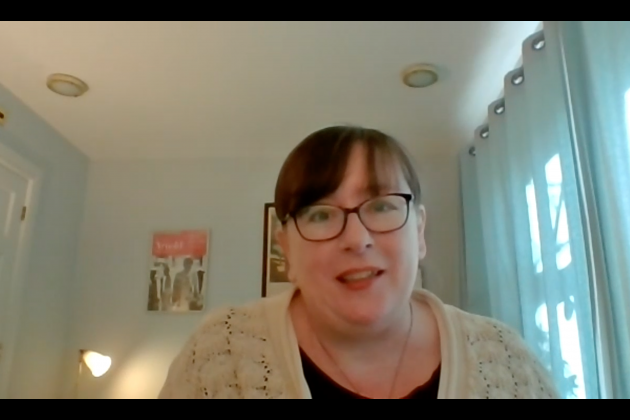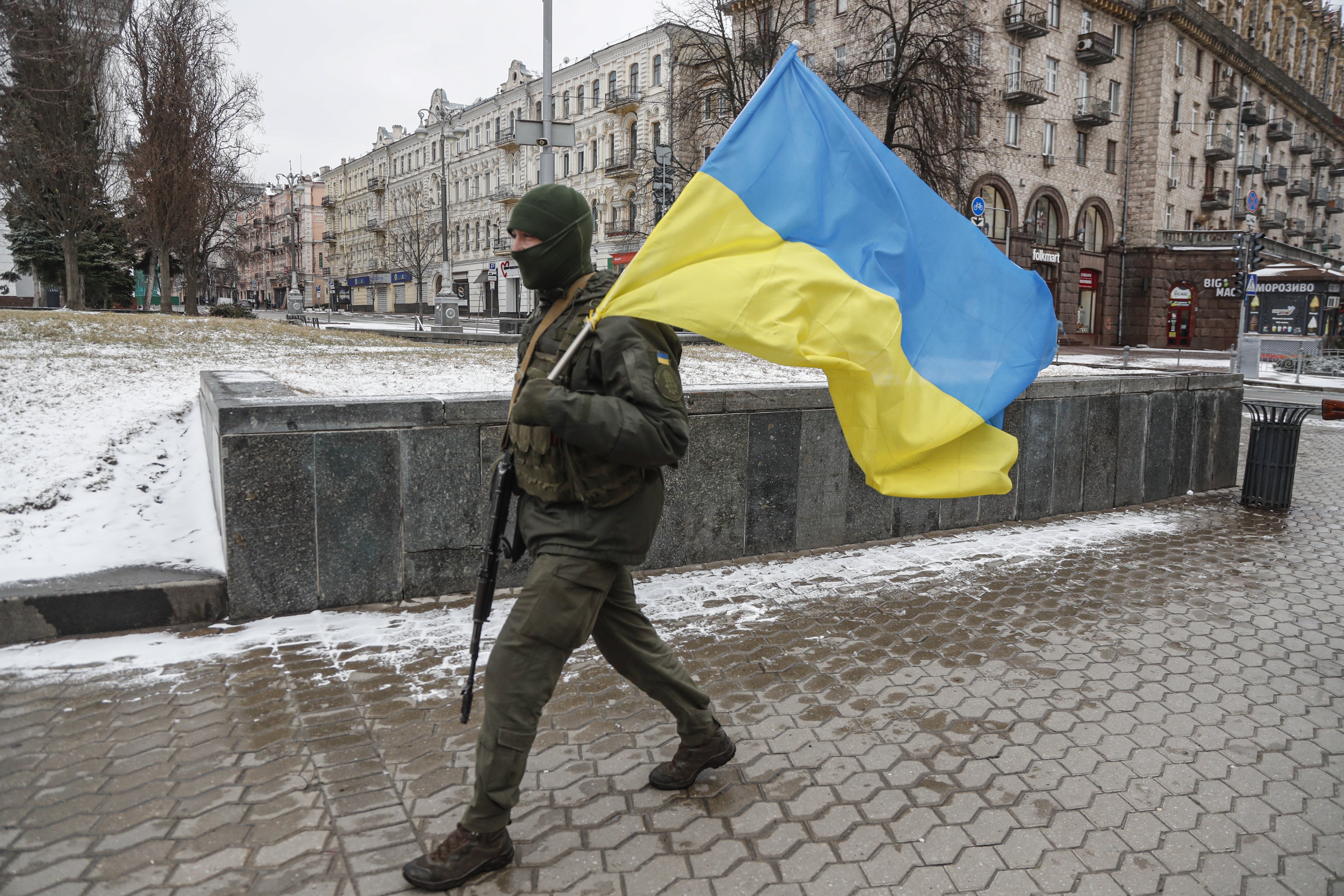It’s been over two weeks since the Kremlin started the war in Ukraine, and the experts on the subject are trying to understand everything that has happened so far in order to see what’s likely can happen from here on in. For Dr Ruth Deyermond, a professor in the Department of War Studies at King's College London, Vladimir Putin has miscalculated. Deyermond is an expert on post-Soviet security and believes that the levels of resistance put up by the Ukrainian people have taken the Russian government by surprise.
In an interview with ElNacional.cat recorded in recent days, she analyzes the key aspects to the conflict and the role that the mainly economic sanctions being applied by countries such as the United Kingdom can play. Apart from her academic research on Russian foreign policy in the post-Soviet world, Ruth Deyermond has worked in the UK treasury, and is critical of some of the British government’s current policies.
After so many years of studying the Kremlin's foreign policy and Putin's current government, what do you think are the real reasons for a Russian military invasion of Ukraine?
I think there was no obvious trigger for the war. You know, Ukraine hadn't done anything to cause the invasion to happen. And that's one of the strange things about the war. In 2014, it did seem to me that what happened in Crimea was a response to what was happening in the rest of Ukraine and in particular to concerns about Ukraine acquiring a government that would be anti-Russian, that would try to join NATO and deny Russia access to the Black Sea fleet base that it had in Crimea. There were some specific issues, I think, but none of them excuse the actions, of course, I mean, it was an illegal annexation. But this all feels very different. It seems to me that the decision-making process inside the Kremlin - Putin's decision making - has changed. It's become much less predictable. It doesn't seem entirely rational to me.
And is there any reason why they decided to start the invasion now, in February 2022?
One thing that was very noticeable was that this invasion was started at a point when four of the major Western states had governments that were either weak or at a point of change. So, Joe Biden in America is facing midterm elections this year, and is unpopular, politically weak. In Britain, of course, we have the Conservative Party that's going through a scandal with the issue of parties during lockdown and all sorts of issues, so they're weak or they have looked weak. In France, you have presidential elections, so Macron has to be very careful about what he does internationally. And then in Germany, you had Angela Merkel stepping down after so many years and a new chancellor taking her place. European states have been divided in lots of ways for many years. And those four key states all having this period of weakness I think it made the West look even weaker. But actually, what we've seen is Western states coming together in a way that they haven't done for many years, if at all. So it's ironic, or a paradox.

Dr Ruth Deyermond, during the interview with ElNacional.cat
So Putin didn’t expect the war to unfold in this way and receive the response that it has done?
Putin wanted to exploit Western weakness or divisions between Western states. But his actions have actually reversed that process of developing weakness. So it's had exactly the opposite effect to what he wanted for the role that these governments are taking. It seems as if Putin and his inner circle expected a very easy and quick war, something like Crimea in 2014, which was very quick. So I think that he was expecting something like that, too, especially in eastern Ukraine, in Luhansk and Donetsk, where again, there was a large proportion of the population that was pro-Russian that wasn't opposed to closer connections with Russia. But actually, he's fighting a totally different kind of war.
And what kind of war is it?
This is more like a classic war of imperial conquest or occupation. And you know, the levels of resistance that we're seeing are not a surprise to me or to many analysts, I think. But strangely, they seem to be a surprise to the Kremlin, which is very, very odd. It seems that Putin thinks that Ukraine isn't a real state or a real nation, and they don't understand that Ukrainians feel differently, although now I guess they probably do understand. And that has caused them to misunderstand the type of war that they're fighting. The consequence of that for them has been military disaster, really of a kind that they haven't experienced since the first Chechen War in the 1990s.
It seems that Putin didn't think that Ukraine was a real state or a real nation. Although now I guess they may understand
So is Putin failing?
It's still a very, very early stage of the war, isn't it? Most wars are a lot longer than this. But I don't see how the Russian government can achieve its political objectives in this war because it has already failed to do that, you know, it's failed to achieve a quick, low cost victory that removed this pro-Western, broadly pro-Western Ukrainian government. It's impossible for him to win. In some ways, even if he achieves a temporary military victory - I don't think that will work in the long term because there will be resistance. But even if he achieves some military victory, he can't achieve his political objectives. He can't get what he wants from the war. So ultimately, there will have to be some kind of negotiation process because Russia will have to withdraw from this situation and try to maintain some of its international reputation. I think it's likely that they will want to have serious negotiations, but not yet. They're not ready.
And what could make them sit down to negotiate?
The sanctions that are coming or have been applied are going to have such devastating economic impacts on Russian people. And that, in combination with very high casualty figures, which we're starting to see, you know, lots of Russian soldiers being killed. These two things together are going to put a lot of pressure on the Russian government. They can't sustain that for a very long time, you know, crippling effects on the economy. Inability to finance an ongoing conflict and the effects of a high casualty rate. So sanctions, I think, are a key component of ultimately forcing the Russian government to start a serious dialogue about how the war ends.
Some key aspects of the war have already been lost by Putin. It's impossible for him to win
The economic sanctions in Russia that he talks about have been the main response of Western countries. Is it a good strategy?
Wars are very, very expensive, and so the longer the war goes on, the more costly it is for the Russian government. And when there are significant sanctions, then it becomes difficult for the Russian government to raise money to finance the war. Now, actually in that area, the British government is doing reasonably well, sanctioning some of the broader aspects of the Russian economy. Instead, they have not acted against some individuals, against the oligarchs, as other countries are sanctioning. And there is a lot of discussion in Britain about financial links between the party of government, the Conservative Party and some of these individuals. The UK is falling behind other Western states on issues of sanctions, and sanctions will be critical to the outcome of the war.
And with all this, has the conflict in Ukraine changed the way Western states have acted since the end of the Cold War?
I think they thought the West was divided and wouldn't put up any real resistance to the invasion of Ukraine because of being preoccupied with other things. But it hasn’t been like that. On the contrary, for example, we see for the first time citizens in neutral Scandinavian states, Sweden and Finland, supporting the idea of joining NATO. A majority of Finnish people, I think for the first time are in favour of join NATO, and almost 50% of Swedes are also in favour of joining. And that would not have happened before this. So you see a more united Europe, NATO becoming stronger. Germany for the first time, upturning 75 years of post-World War II defence policy to fully commit to stronger German armed forces. All of this in response to what Putin has done. And that's exactly the opposite of what he wants to achieve. Both inside Ukraine and in terms of the European security order, what's happened is precisely the opposite of what Putin wants. That's why I also think he's completely failed to achieve his objectives.
And is there any risk that all this will end in a direct confrontation between the West and Russia?
I think that both NATO and Russia are still being quite careful to avoid confrontation with each other. Because they don't want anything to escalate into a wider war, because, of course, escalation to a wider war carries the risk of escalation to nuclear war between Russia and NATO. For example, individual states and NATO have been very clear that there is not going to be a NATO no-fly zone over Ukraine because a no-fly zone would mean that NATO's planes or equipment would be shooting Russian planes out of the sky. And that, of course, very likely, would trigger war. So the fact that they are avoiding this, that is an indication, I think, of how careful NATO is being to avoid a wider conflict with Russia. And I don't see Russia wanting to start a wider conflict, firstly because they don't want a nuclear war. And secondly, because I don't see how they could fight one while doing so badly in Ukraine. It's impossible to see how they could fight a conventional war against NATO at the same time as fighting the war in Ukraine.

